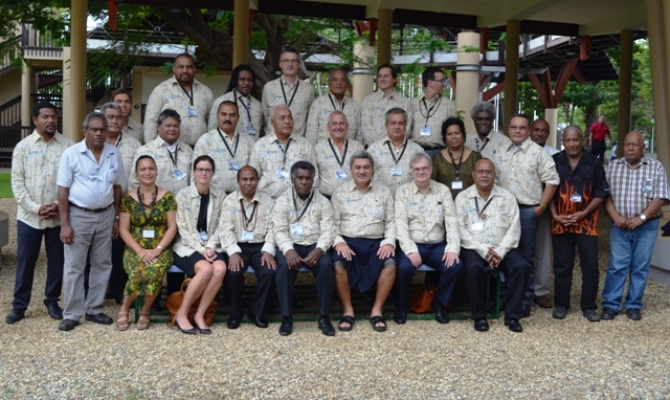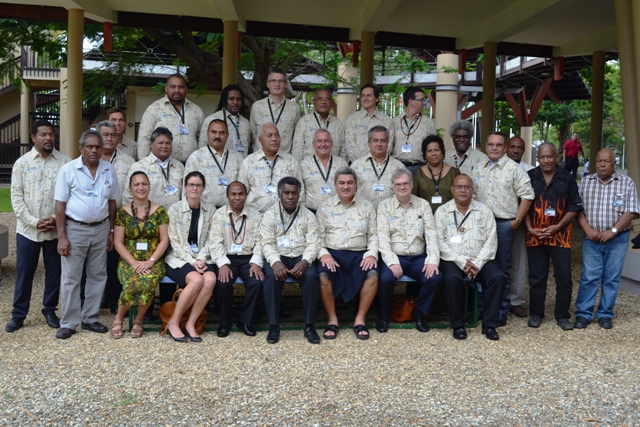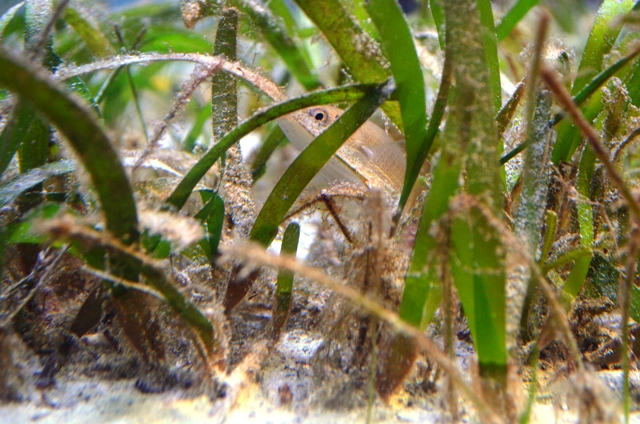
Island and Ocean Ecosystems
The value of seagrass may come as a surprise to some - but this ocean plant is three times more valuable than coral reefs when it comes to ecosystem services and it can store carbon 35 times faster than rainforests.
The impacts of climate change on Pacific marine biodiversity were discussed during the Oceania 21 Conference in New Caledonia this month. The three day meeting brought together 17 Pacific island governments and development partners to help strengthen the Pacific voice at the climate negotiations in Paris at the end of this year.
 Oceania 21
Oceania 21
As residents in the Pacific Ocean, the world's largest body of water, the impacts of climate change on the oceans will have a direct effect on the livelihoods and way of life for Pacific islanders.
"The forecasts from the Intergovernmental Panel on Climate Change are very clear - we'll be seeing immense changes in our oceans," presented Mr. Michael Donoghue, Threatened and Migratory Species Adviser at the Secretariat of the Pacific Regional Environment Programme (SPREP), at Oceania 21.
"There will be changes in ocean currents and upwellings, changes in the availability of prey. We'll see coral bleaching, changes in the distribution of migratory species, larval dispersal and changes in the timing of migrations of species such as the humpback whale. We will all be impacted by climate change, all life on earth, both people and other species alike."
As part of the Alliance of Small Island States, Pacific island nations are calling for the world to lower the target for global warming by 2100 to 1.5 degrees above pre-industrial levels, aware that coral reefs will bleach and eventually die if global warming reaches 2 degrees Celsius. Coral reefs along with seagrass play a vital role in sustaining the livelihoods of Pacific islanders.
 Seagrass provides a nursery for fish and prawns
Seagrass provides a nursery for fish and prawns
Seagrass is one natural solution to help locally offset ocean acidification caused by climate change while at the same time providing a nursery for certain fisheries such as fish and prawns. It also helps to provide food for protected animals or those vulnerable to extinction; a dugong can eat 28 – 40 kilos of seagrass in one day and a green turtle can eat 2 kilos of sea grass leaves in a day.
The marine plant species can also act as an oxygen pump with 1m2 of seagrass able to produce up to 10 litres of oxygen each day.
"Despite being this wonderful resource - a prime example of how our natural environment can work for us, approximately 58% of segrass meadows globally have lost their distribution worldwide. Since 1980 we have been losing the equivalent of two football fields of seagrass every hour," said Mr. Donoghue
"Seagrass is an ideal resource to help us mitigate the impacts of climate change on Pacific marine biodiversity and we all need to wake up to this."
The 3rd Oceania 21 Meeting hosted in New Caledonia was chaired by the Government of Samoa and was held from 28 – 30 April. It was during the forum on the topic "Scientific research, an essential support tool to address climate change" that Mr. Michael Donoghue made a presentation on the Impacts of climate change on Pacific marine biodiversity.
The Oceania 21 meeting resulted in the Lifou Declaration, for more information on seagrass and the impact of climate change on Pacific marine biodiversity please contact Mr. Michael Donoghue, SPREP's Threatened and Migratory Species Advisor.
The impacts of climate change on Pacific marine biodiversity were discussed during the Oceania 21 Conference in New Caledonia this month. The three day meeting brought together 17 Pacific island governments and development partners to help strengthen the Pacific voice at the climate negotiations in Paris at the end of this year.
 Oceania 21
Oceania 21As residents in the Pacific Ocean, the world's largest body of water, the impacts of climate change on the oceans will have a direct effect on the livelihoods and way of life for Pacific islanders.
"The forecasts from the Intergovernmental Panel on Climate Change are very clear - we'll be seeing immense changes in our oceans," presented Mr. Michael Donoghue, Threatened and Migratory Species Adviser at the Secretariat of the Pacific Regional Environment Programme (SPREP), at Oceania 21.
"There will be changes in ocean currents and upwellings, changes in the availability of prey. We'll see coral bleaching, changes in the distribution of migratory species, larval dispersal and changes in the timing of migrations of species such as the humpback whale. We will all be impacted by climate change, all life on earth, both people and other species alike."
As part of the Alliance of Small Island States, Pacific island nations are calling for the world to lower the target for global warming by 2100 to 1.5 degrees above pre-industrial levels, aware that coral reefs will bleach and eventually die if global warming reaches 2 degrees Celsius. Coral reefs along with seagrass play a vital role in sustaining the livelihoods of Pacific islanders.
 Seagrass provides a nursery for fish and prawns
Seagrass provides a nursery for fish and prawnsThe marine plant species can also act as an oxygen pump with 1m2 of seagrass able to produce up to 10 litres of oxygen each day.
"Despite being this wonderful resource - a prime example of how our natural environment can work for us, approximately 58% of segrass meadows globally have lost their distribution worldwide. Since 1980 we have been losing the equivalent of two football fields of seagrass every hour," said Mr. Donoghue
"Seagrass is an ideal resource to help us mitigate the impacts of climate change on Pacific marine biodiversity and we all need to wake up to this."
The 3rd Oceania 21 Meeting hosted in New Caledonia was chaired by the Government of Samoa and was held from 28 – 30 April. It was during the forum on the topic "Scientific research, an essential support tool to address climate change" that Mr. Michael Donoghue made a presentation on the Impacts of climate change on Pacific marine biodiversity.
The Oceania 21 meeting resulted in the Lifou Declaration, for more information on seagrass and the impact of climate change on Pacific marine biodiversity please contact Mr. Michael Donoghue, SPREP's Threatened and Migratory Species Advisor.